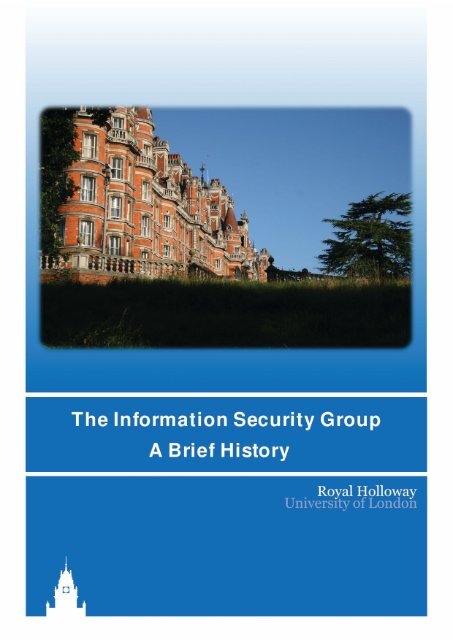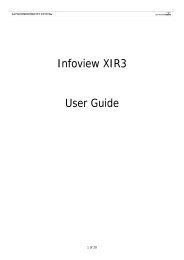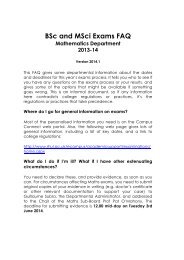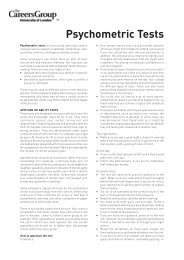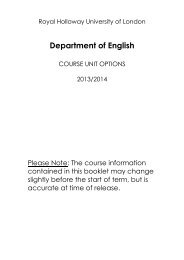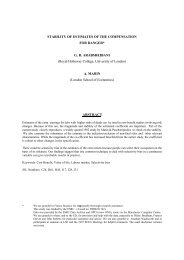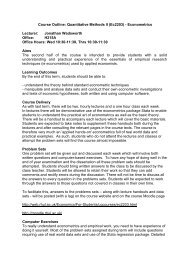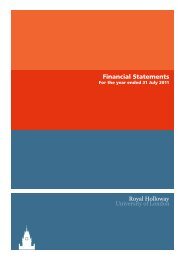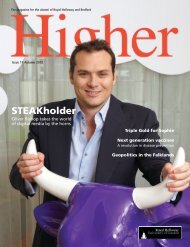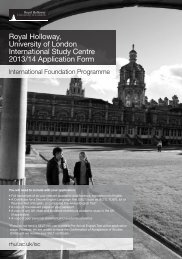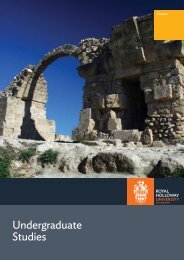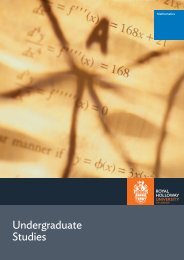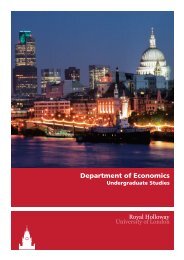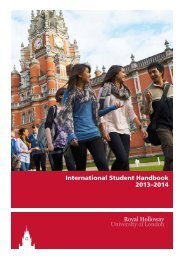a short history of the ISG - Royal Holloway, University of London
a short history of the ISG - Royal Holloway, University of London
a short history of the ISG - Royal Holloway, University of London
You also want an ePaper? Increase the reach of your titles
YUMPU automatically turns print PDFs into web optimized ePapers that Google loves.
The Information Security Group - A Brief History<br />
A Brief History <strong>of</strong> <strong>the</strong> <strong>Royal</strong> <strong>Holloway</strong><br />
Information Security Group<br />
The Early Years<br />
In <strong>the</strong> early 1980s, <strong>the</strong> <strong>University</strong> <strong>of</strong> <strong>London</strong> was re-structured to decrease <strong>the</strong> number <strong>of</strong><br />
small colleges. <strong>Royal</strong> <strong>Holloway</strong> College merged with Bedford College to form <strong>Royal</strong><br />
<strong>Holloway</strong> and Bedford New College, but <strong>the</strong> re-structuring <strong>of</strong> Ma<strong>the</strong>matics did not follow<br />
<strong>the</strong> university plan.<br />
In <strong>the</strong> restructuring <strong>of</strong> Ma<strong>the</strong>matics it was decided that each college should be <strong>the</strong><br />
<strong>University</strong>’s research centre for one (or more) branches <strong>of</strong> <strong>the</strong> subject, and many <strong>of</strong> <strong>the</strong><br />
ma<strong>the</strong>maticians were transferred to <strong>Royal</strong> <strong>Holloway</strong> with <strong>the</strong> justification that it would<br />
become <strong>the</strong> centre for discrete ma<strong>the</strong>matics/combinatorics. At that time Fred Piper, who<br />
was head <strong>of</strong> Ma<strong>the</strong>matics at Westfield College (which subsequently merged with Queen<br />
Mary College to become Queen Mary and Westfield College), and one <strong>of</strong> his ex-PhD<br />
students Henry Beker, who was a visiting pr<strong>of</strong>essor at Westfield, had just published <strong>the</strong>ir<br />
book Cipher Systems. As a result, Fred was asked to direct <strong>the</strong> discrete ma<strong>the</strong>matics<br />
research effort at <strong>Royal</strong> <strong>Holloway</strong> with cryptography as one <strong>of</strong> <strong>the</strong> focal points.<br />
Fred and Henry transferred to <strong>Royal</strong> <strong>Holloway</strong> and Bedford New College in 1985. In order<br />
to help establish cryptography, by <strong>the</strong>n an emerging academic discipline, <strong>the</strong> College<br />
provided one new position to <strong>the</strong> Ma<strong>the</strong>matics department, which was filled by Peter Wild,<br />
also an ex-PhD student from Westfield. They were soon joined by Sean Murphy, an<br />
SERC funded RA, and a number <strong>of</strong> PhD students working on topics ranging from<br />
cryptography and coding <strong>the</strong>ory to block designs. Simultaneously cryptography was<br />
growing in ‘popularity’, and <strong>Royal</strong> <strong>Holloway</strong> was building important strategic relationships<br />
with a number <strong>of</strong> companies. (For example, <strong>the</strong> position <strong>of</strong> Head <strong>of</strong> Ma<strong>the</strong>matics at Racal<br />
Comsec was held by a succession <strong>of</strong> five people who obtained PhD degrees under Fred<br />
Piper’s supervision. The first <strong>of</strong> <strong>the</strong>se was Henry Beker, and <strong>the</strong> second was Chris<br />
Mitchell who, in 1985, moved from Racal Comsec to Hewlett Packard Laboratories in<br />
Bristol).<br />
In 1987 a number <strong>of</strong> companies came to <strong>Royal</strong> <strong>Holloway</strong> to discuss <strong>the</strong> possibility <strong>of</strong><br />
introducing an MSc in Cryptography. Fortunately (with hindsight!) it was felt that this<br />
would be too ‘narrow’, and that a degree in <strong>the</strong> wider area <strong>of</strong> Information Security would<br />
be more beneficial to industry, and produce more students for <strong>Royal</strong> <strong>Holloway</strong>. However,<br />
such a broader vocational degree, aimed at producing information security pr<strong>of</strong>essionals,<br />
required staff with much wider interests than simply cryptography.<br />
The first step towards <strong>the</strong> move from a group <strong>of</strong> specialist ma<strong>the</strong>matical cryptographers to<br />
include more general computer science/information security researchers was to recruit<br />
Chris Mitchell from Hewlett Packard in 1990. Chris was appointed as head <strong>of</strong> <strong>the</strong><br />
Computer Science Department. This was very rapidly followed by <strong>the</strong> appointment <strong>of</strong><br />
Dieter Gollmann as a second computer scientist and Sean Murphy as a Lecturer in<br />
Information Security (a shared appointment between Ma<strong>the</strong>matics and Computer Science<br />
and <strong>the</strong> first appointment with Information Security in <strong>the</strong> title).<br />
1
The Information Security Group - A Brief History<br />
The transfer <strong>of</strong> Chris from HP to <strong>the</strong> <strong>ISG</strong> was significant for many reasons. In addition to<br />
<strong>the</strong> <strong>ISG</strong> recruiting a leading research worker who has played a central role in all its<br />
activities, it also led to <strong>the</strong> foundation <strong>of</strong> an annual one day Colloquium on Information<br />
Security. This colloquium, now known simply as HP day, was essentially a dowry from<br />
HP to <strong>the</strong> <strong>ISG</strong> to build on an already well established partnership. The experience <strong>of</strong><br />
working in industry that Chris brought to <strong>the</strong> <strong>ISG</strong> and <strong>the</strong> engagement with practitioners<br />
that HP day represents symbolise <strong>the</strong> two vital ingredients that have enabled <strong>the</strong> <strong>ISG</strong> to<br />
fulfil Fred’s vision <strong>of</strong> providing <strong>the</strong> academic support that industry wants.<br />
After considerable consultation with our (ever increasing number <strong>of</strong>) industrial partners,<br />
<strong>the</strong> MSc in Information Security was launched in October 1992. In some sense this might<br />
be regarded as <strong>the</strong> starting point for <strong>the</strong> <strong>ISG</strong>. However at that stage <strong>the</strong> group only had a<br />
very informal structure. Chris was Head <strong>of</strong> Computer Science, Fred was Head <strong>of</strong><br />
Ma<strong>the</strong>matics, and decisions were based on friendly agreements ra<strong>the</strong>r than formal<br />
processes. Fur<strong>the</strong>rmore <strong>the</strong> group consisted <strong>of</strong> five friends who frequently met for lunch<br />
etc., and so <strong>the</strong>re was no need for formal meetings.<br />
Developing and launching this MSc is certainly <strong>the</strong> greatest single achievement <strong>of</strong> <strong>the</strong><br />
<strong>ISG</strong>, and all <strong>the</strong> staff at <strong>Royal</strong> <strong>Holloway</strong> who have been involved in <strong>the</strong> growth and<br />
development <strong>of</strong> this course over <strong>the</strong> last 16 years are enormously proud <strong>of</strong> <strong>the</strong><br />
achievements <strong>of</strong> its many graduates. The MSc was <strong>the</strong> first <strong>of</strong> its kind anywhere in <strong>the</strong><br />
world. From its inception it has always been aimed at meeting <strong>the</strong> needs <strong>of</strong> <strong>the</strong> real world,<br />
and <strong>the</strong> <strong>ISG</strong> has continued to maintain and develop its strong links with industry and<br />
commerce.<br />
One indication <strong>of</strong> <strong>the</strong>se links with <strong>the</strong> ‘outside world’ is <strong>the</strong> fact that <strong>the</strong> MSc has always<br />
relied on ‘outside’ lecturers to cover areas where we had no expertise, and to ensure<br />
industrial relevance. Indeed, in <strong>the</strong> early years Chez Ciechanowicz, who later joined <strong>the</strong><br />
<strong>ISG</strong> and became MSc programme director, was one <strong>of</strong> <strong>the</strong> first!<br />
In <strong>the</strong> first year <strong>the</strong> MSc had 7 full-time students and 3 part-timers, one <strong>of</strong> whom was<br />
Andreas Fuchsberger. Andreas subsequently became a research assistant, running <strong>the</strong><br />
first <strong>ISG</strong> Lab, sponsored by HP, and later still came back as a lecturer. Having a small<br />
number <strong>of</strong> students enabled <strong>the</strong> establishment <strong>of</strong> a family atmosphere with close working<br />
relationships between staff and students. During this first year, Pauline Stoner was<br />
appointed as Fred’s PA and became a focal point for <strong>the</strong> students to discuss <strong>the</strong>ir<br />
problems. As <strong>the</strong> number <strong>of</strong> students increased Pauline played a crucial role in helping to<br />
maintain that family atmosphere.<br />
As <strong>the</strong> MSc grew in <strong>the</strong> mid 1990s, <strong>the</strong> <strong>ISG</strong>’s <strong>the</strong>me <strong>of</strong> Academia and Industry in Harmony<br />
was developing. One <strong>of</strong> our main partners was Zergo, founded by Henry Beker, who<br />
introduced a structured Information Security training programme on which members <strong>of</strong> <strong>the</strong><br />
<strong>ISG</strong> lectured. This led in 1994 to <strong>the</strong> Introduction <strong>of</strong> <strong>the</strong> Postgraduate Diploma in<br />
Information Security, based on courses <strong>of</strong>fered by Zergo and an MSc level dissertation<br />
supervised by <strong>Royal</strong> <strong>Holloway</strong> academics.<br />
In July 1995, after completing his five-year appointment period, Chris ceased to be Head<br />
<strong>of</strong> Computer Science. This had serious consequences for <strong>the</strong> <strong>ISG</strong>, as it necessitated <strong>the</strong><br />
formalisation <strong>of</strong> many <strong>of</strong> <strong>the</strong> ad hoc agreements about <strong>the</strong> <strong>ISG</strong> made between Chris and<br />
Fred. At <strong>the</strong> same time, numbers on <strong>the</strong> MSc were increasing dramatically, and a case<br />
was made for a new lecturer. Chez was appointed in 1996 but, although he was<br />
2
The Information Security Group - A Brief History<br />
appointed as a Lecturer in Information Security, he was appointed to <strong>the</strong> Ma<strong>the</strong>matics<br />
Department and not as a joint appointment. At this time John Austen was contracted as a<br />
consultant to enhance <strong>the</strong> MSc by adding <strong>the</strong> Computer Crime module. In <strong>the</strong> same year<br />
<strong>the</strong> <strong>ISG</strong>’s research links to industry were enhanced by <strong>the</strong> establishment <strong>of</strong> <strong>the</strong> (part time)<br />
Vodafone Chair <strong>of</strong> Telecommunications, which was filled by Michael Walker.<br />
It is interesting to note that, in order to justify Chez’s appointment, <strong>the</strong> <strong>ISG</strong> had to accept a<br />
target <strong>of</strong> 30 MSc students. In fact, at <strong>the</strong> height <strong>of</strong> <strong>the</strong> dotcom era we had over 250 MSc<br />
students. Luckily for project supervisors and exam markers, numbers later stabilized at<br />
about 150!<br />
Eventually, in 1998, all responsibility for Information Security activities was transferred to<br />
<strong>the</strong> Ma<strong>the</strong>matics department. By this point Dieter had left <strong>the</strong> <strong>ISG</strong> for a research position<br />
at Micros<strong>of</strong>t Research, but Chris and Sean formally transferred to Ma<strong>the</strong>matics.<br />
The next major landmark was <strong>the</strong> award to <strong>the</strong> College <strong>of</strong> The Queen’s Anniversary Prize<br />
for Higher and Fur<strong>the</strong>r Education <strong>of</strong> 1998. This prestigious award was given in<br />
recognition <strong>of</strong> <strong>the</strong> work <strong>of</strong> <strong>the</strong> <strong>ISG</strong> with <strong>the</strong> following citation:<br />
“This pioneering Group provides a unique national resource for <strong>the</strong> training<br />
<strong>of</strong> information security specialists and <strong>the</strong> development <strong>of</strong> highly secure<br />
communications and computer systems. It <strong>of</strong>fers world-leading<br />
independent expertise in a field <strong>of</strong> crucial importance where trust and<br />
integrity are paramount.”<br />
This had <strong>the</strong> effect <strong>of</strong> fur<strong>the</strong>r raising <strong>the</strong> pr<strong>of</strong>ile <strong>of</strong> <strong>the</strong> <strong>ISG</strong>. At <strong>the</strong> same time <strong>the</strong> need for<br />
Information Security was gaining wider recognition, and numbers on <strong>the</strong> MSc fur<strong>the</strong>r<br />
increased, justifying an increase in <strong>ISG</strong> staff.<br />
Certainly, <strong>the</strong> success <strong>of</strong> <strong>the</strong> MSc and <strong>the</strong> subsequent expansion <strong>of</strong> <strong>the</strong> group have<br />
provided <strong>the</strong> resources to enable <strong>the</strong> <strong>ISG</strong> to make a contribution to <strong>the</strong> field <strong>of</strong> information<br />
security. But perhaps its greatest asset consists <strong>of</strong> its students and alumni. Students from<br />
a wide variety <strong>of</strong> backgrounds have brought <strong>the</strong>ir different experiences and insights to <strong>the</strong><br />
MSc to enhance <strong>the</strong> learning experience for all. And our alumni, now spread throughout<br />
<strong>the</strong> world and in many different companies and enterprises, have continued to support <strong>the</strong><br />
<strong>ISG</strong> and contribute to its work.<br />
Given that Fred’s initial brief was to build a discrete ma<strong>the</strong>matics research centre, it is not<br />
surprising that <strong>the</strong> initial growth <strong>of</strong> <strong>the</strong> <strong>ISG</strong> and its taught MSc was accompanied by an<br />
equal expansion in research activity with, initially, concentration on some <strong>of</strong> <strong>the</strong><br />
ma<strong>the</strong>matical aspects <strong>of</strong> cryptography. Ano<strong>the</strong>r ‘founder’ member <strong>of</strong> <strong>the</strong> <strong>ISG</strong> was Mike<br />
Burmester. Mike was a finite geometer who had his interest aroused by <strong>the</strong> cryptography<br />
research going on around him. As well as attracting numerous Greek students, Mike was<br />
an additional member <strong>of</strong> <strong>the</strong> team for supervising projects. He also established a prolific<br />
research partnership with Yvo Desmedt (who became a Visiting Pr<strong>of</strong>essor), and was <strong>the</strong><br />
<strong>ISG</strong>’s informal ‘ambassador’ at many international conferences.<br />
The <strong>ISG</strong> has always been and continues to be a centre for research in ma<strong>the</strong>matical<br />
cryptography. Simon Blackburn and Steven Galbraith, both now Pr<strong>of</strong>essors <strong>of</strong><br />
Ma<strong>the</strong>matics, began <strong>the</strong>ir careers as research assistants in <strong>the</strong> <strong>ISG</strong> in <strong>the</strong> 1990s.<br />
However, <strong>the</strong> group’s research has diversified over <strong>the</strong> years and, as <strong>the</strong> CVs <strong>of</strong> current<br />
3
The Information Security Group - A Brief History<br />
members <strong>of</strong> <strong>the</strong> <strong>ISG</strong> show, now covers an impressively wide range <strong>of</strong> Information Security<br />
topics. In parallel with <strong>the</strong> MSc, <strong>the</strong> early PhD programme in ma<strong>the</strong>matical cryptography<br />
and discrete ma<strong>the</strong>matics thrived and expanded into o<strong>the</strong>r (ma<strong>the</strong>matical and computer<br />
science) areas related to information security. Members <strong>of</strong> <strong>the</strong> <strong>ISG</strong> have supervised well<br />
over 100 successful PhD students.<br />
Changes and developments have multiplied rapidly since 2000, and this brief <strong>history</strong> does<br />
not attempt to list all <strong>the</strong> developments over <strong>the</strong> last eight years. We conclude by simply<br />
listing a few <strong>of</strong> <strong>the</strong> most important developments in that time:<br />
• The <strong>ISG</strong> grew dramatically from <strong>the</strong> year 2000. The number <strong>of</strong> full time academic<br />
appointments rose to 20; <strong>the</strong>re have been 8 visiting pr<strong>of</strong>essors and more than 20<br />
post doctoral research assistants. In addition <strong>the</strong> number <strong>of</strong> PhD students<br />
registered at a given time rose to about 60.<br />
• The range <strong>of</strong> courses <strong>of</strong>fered as part <strong>of</strong> <strong>the</strong> Masters degree has continued to<br />
expand. In 1992 <strong>the</strong>re were 4 core and 4 options modules. Between 1996 and<br />
2008 <strong>the</strong> following modules have been added<br />
1. Legal and Regulatory Aspects <strong>of</strong> Electronic Commerce<br />
2. Security Technologies<br />
3. Computer Crime<br />
4. Smart Cards/Tokens Security and Applications<br />
5. S<strong>of</strong>tware Security (development funded by Micros<strong>of</strong>t )<br />
6. Trusted Computing (development funded by <strong>the</strong> EU as part <strong>of</strong> <strong>the</strong> Open<br />
Trusted Computing project)<br />
In 2008, development work started on two optional modules to cover Forensics and<br />
Penetration Testing, with an intended start date <strong>of</strong> 2009/10.<br />
• In order to accommodate <strong>the</strong> need <strong>of</strong> students with interests focused on e-<br />
commerce, an MSc in Secure Electronic Commerce was introduced in 1999. As<br />
part <strong>of</strong> its introduction, <strong>the</strong>re was a need to introduce a course on legal aspects <strong>of</strong><br />
security, and we were very fortunate to be able to persuade Robert Carolina to<br />
begin his association with <strong>the</strong> group by teaching this course. This MSc ran for five<br />
years, and was <strong>the</strong>n restructured to become <strong>the</strong> “Secure Digital Business” pathway<br />
through <strong>the</strong> Information Security MSc, to which Robert still contributes.<br />
• The Smart Card Centre was founded in October 2002 by <strong>Royal</strong> <strong>Holloway</strong>,<br />
Vodafone and Giesecke & Devrient. It is a testimony to <strong>the</strong> reputation <strong>of</strong> <strong>the</strong> <strong>ISG</strong><br />
that <strong>the</strong> largest mobile operator in <strong>the</strong> world and one <strong>of</strong> <strong>the</strong> largest global card<br />
manufacturers, chose to found <strong>the</strong> centre at <strong>Royal</strong> <strong>Holloway</strong>. Six years on <strong>the</strong><br />
Smart Card Centre has established its own reputation and fulfilled <strong>the</strong> founders’<br />
primary objective <strong>of</strong> creating a worldwide centre <strong>of</strong> excellence for training and<br />
research in <strong>the</strong> field <strong>of</strong> smart cards, applications and related technologies.<br />
• In 2003 a Distance Learning (DL) version <strong>of</strong> <strong>the</strong> technical pathway <strong>of</strong> <strong>the</strong> MSc was<br />
launched through <strong>the</strong> External Programme <strong>of</strong> <strong>the</strong> <strong>University</strong> <strong>of</strong> <strong>London</strong>, <strong>the</strong>reby<br />
opening up a totally new market for <strong>the</strong> <strong>ISG</strong>. Apart from a small time-lag, <strong>the</strong> DL<br />
and campus versions <strong>of</strong> <strong>the</strong> MSc are essentially <strong>the</strong> same. Within <strong>the</strong> first few<br />
years <strong>the</strong> total number <strong>of</strong> registrations at any given time grew to its current level <strong>of</strong><br />
200 students and <strong>the</strong> first DL students graduated in 2005.<br />
• In 2008 as a response to industry demands, <strong>ISG</strong> introduced Block Mode delivery<br />
for a substantial proportion <strong>of</strong> <strong>the</strong> MSc. In this mode students attend <strong>the</strong> lectures<br />
for a module in an intensive 5-day period. They <strong>the</strong>n complete <strong>the</strong> exercises and<br />
fur<strong>the</strong>r reading at <strong>the</strong>ir own pace. With all <strong>the</strong> various delivery modes now<br />
available, we have developed a totally flexible way <strong>of</strong> studying <strong>the</strong> MSc over an<br />
4
The Information Security Group - A Brief History<br />
extended period. Fur<strong>the</strong>rmore, anyone needing to refresh <strong>the</strong>ir knowledge, or to<br />
clock up some CPD credits, can enrol for a single module (with or without <strong>the</strong><br />
corresponding examination).<br />
• We now have <strong>the</strong> support <strong>of</strong> a large and impressive group <strong>of</strong> distinguished Visiting<br />
Pr<strong>of</strong>essors.<br />
• Laboratory facilities for <strong>the</strong> students have improved dramatically since <strong>the</strong> early<br />
days, and <strong>the</strong> <strong>ISG</strong> now has its own highly complex computing environment that<br />
needs undivided attention from a full-time Network Manager and supporting<br />
System Administrator.<br />
Information Security Group<br />
<strong>Royal</strong> <strong>Holloway</strong><br />
<strong>University</strong> <strong>of</strong> <strong>London</strong><br />
Egham, 21 st July 2008<br />
5
The Information Security Group - A Brief History<br />
<strong>ISG</strong> Members – Past and Present<br />
Academic Staff<br />
Pr<strong>of</strong>essor Simon Blackburn BSc (Bristol) DPhil (Oxon)<br />
Simon Blackburn received his BSc in Ma<strong>the</strong>matics from Bristol <strong>University</strong> in<br />
1989 and his DPhil in Ma<strong>the</strong>matics from Oxford <strong>University</strong> in 1992. From<br />
1992 to 1995, he was a Research Assistant in <strong>the</strong> Department <strong>of</strong><br />
Ma<strong>the</strong>matics at <strong>Royal</strong> <strong>Holloway</strong>, specialising in Stream Ciphers. From 1995<br />
to 2000, he was an EPSRC Advanced Fellow. He is currently a Pr<strong>of</strong>essor in<br />
Pure Ma<strong>the</strong>matics. His research interests include combinatorics, group<br />
<strong>the</strong>ory and cryptography.<br />
Pr<strong>of</strong>essor Mike Burmester BA (A<strong>the</strong>ns) Dott Mat (Rome, La Sapienza)<br />
Mike is currently a Pr<strong>of</strong>essor at Florida State <strong>University</strong>. He is a co-director<br />
<strong>of</strong> SAIT Laboratories, a Center <strong>of</strong> Academic Excellence in Information<br />
Assurance Education as designated by <strong>the</strong> National Security Agency. Until<br />
2001 he was a Reader in <strong>the</strong> Information Security Group. His research<br />
interest include cryptography, network security, security <strong>of</strong><br />
pervasive/ubiquitous systems, privacy/anonymity,<br />
Watermarking/Fingerprinting and MANETs. Currently he is working on<br />
distributed sensor network security, multi-domain trust management, secure<br />
RFID systems, secure routing in MANETs and border surveillance<br />
Carlos Cid BSc PhD (UnB, Brazil)<br />
Carlos Cid received his PhD in Ma<strong>the</strong>matics from <strong>the</strong> <strong>University</strong> <strong>of</strong> Brasilia,<br />
Brazil, in 1999. After working for a <strong>short</strong> period as a lecturer in Brazil, he<br />
spent a year as a postdoctoral researcher at RWTH-Aachen, Germany.<br />
Between 2001 and 2003, he worked as a s<strong>of</strong>tware engineer for an Irish<br />
start-up where he was involved in <strong>the</strong> design and development <strong>of</strong> hardware<br />
security modules and network security appliances. He joined <strong>the</strong><br />
Information Security Group in October 2003 as a postdoctoral research<br />
assistant to work on <strong>the</strong> EPSRC-funded project “Security Analysis <strong>of</strong> <strong>the</strong><br />
Advanced Encryption Standard (AES)”. He is currently a RCUK Academic<br />
Fellow. Carlos has a broad interest in <strong>the</strong> area <strong>of</strong> Information Security, in<br />
particular cryptography.<br />
Zbigniew ‘Chez’ Ciechanowicz BSc PhD (<strong>London</strong>) Course Director,<br />
Information Security Group<br />
Chez received his BSc (Hons) in Pure Ma<strong>the</strong>matics in 1975 from <strong>the</strong><br />
<strong>University</strong> <strong>of</strong> <strong>London</strong>, and his PhD degree in Ma<strong>the</strong>matics (also from <strong>the</strong><br />
<strong>University</strong> <strong>of</strong> <strong>London</strong>) in 1980. He <strong>the</strong>n worked at <strong>the</strong> National Physical<br />
Laboratory for five years specialising firstly in compiler validation, <strong>the</strong>n in<br />
cryptography and digital signatures. He ended his stay at <strong>the</strong> Laboratory<br />
holding <strong>the</strong> rank <strong>of</strong> Senior Scientific Officer. His next appointment was as a<br />
6
The Information Security Group - A Brief History<br />
full-time lecturer in <strong>the</strong> Computer Science Department <strong>of</strong> <strong>Royal</strong> <strong>Holloway</strong>,<br />
his main area <strong>of</strong> interest being cryptography. Between 1989 and 1995,<br />
Chez worked as a consultant at Zergo Ltd, and his main areas <strong>of</strong> interest<br />
<strong>the</strong>re were risk analysis and security management. Whilst at Zergo, he<br />
performed numerous security reviews for large Government departments<br />
and industrial institutions throughout Europe and <strong>the</strong> States. He was a<br />
principal author <strong>of</strong> Zergo’s own risk analysis method. Between 1996 and<br />
2003, he was <strong>the</strong> editor <strong>of</strong> <strong>the</strong> Elsevier Information Security Technical<br />
Report, and is currently still on <strong>the</strong> editorial board. For an extended period<br />
Chez went on secondment to <strong>the</strong> Information Security Group as a Teaching<br />
Fellow, and also as Programme Director for <strong>the</strong> MSc in Information<br />
Security. In 1997 he became a founder member <strong>of</strong> <strong>the</strong> British Computer<br />
Society’s ISEB Information Security Management Certificate Board and sat<br />
on <strong>the</strong> Board until 2004. Chez became a permanent member <strong>of</strong> <strong>the</strong><br />
Information Security Group in 2001. He has also served as a member <strong>of</strong><br />
(ISC) 2 ‘s CBK Review Committee. Whilst at <strong>Royal</strong> <strong>Holloway</strong>, Chez has been<br />
involved in a number <strong>of</strong> high pr<strong>of</strong>ile consultancy activities including security<br />
studies for TfL’s Oyster Card.<br />
Lizzie Coles-Kemp BA (Hull) MSc (<strong>London</strong>)<br />
Lizzie Coles-Kemp was awarded a BA (Hons) in Scandinavian Studies and<br />
Linguistics from <strong>the</strong> <strong>University</strong> <strong>of</strong> Hull in 1988. She worked as a UNIX<br />
s<strong>of</strong>tware trainer and translator. In 1991, she joined <strong>the</strong> Swedish security<br />
s<strong>of</strong>tware company, Dynamic S<strong>of</strong>tware AB, eventually becoming director <strong>of</strong><br />
<strong>the</strong> UK subsidiary, DynaS<strong>of</strong>t Ltd. In 1997, Lizzie left DynaS<strong>of</strong>t to become<br />
global IT Security Officer for <strong>the</strong> British Council and completed <strong>the</strong> MSc in<br />
Information Security at <strong>Royal</strong> <strong>Holloway</strong>. She now subcontracts as a parttime<br />
Lead Assessor for Lloyds Register Quality Assurance (LRQA). She<br />
contributes to <strong>the</strong> distance learning version <strong>of</strong> <strong>the</strong> MSc in Information<br />
Security, tutoring in Security Management and Standards and Evaluation<br />
Criteria and module leading for Secure Electronic Commerce and O<strong>the</strong>r<br />
Applications. Lizzie was appointed as a Lecturer in 2007 and contributes to<br />
<strong>the</strong> BSc/MSc in Biomedical Informatics which is a collaborative programme<br />
between St George’s, <strong>University</strong> <strong>of</strong> <strong>London</strong>, Kingston <strong>University</strong> and <strong>Royal</strong><br />
<strong>Holloway</strong>. Her academic research areas are currently risk assessment,<br />
organization <strong>the</strong>ory, complex adaptive systems <strong>the</strong>ory applied to decisionmaking<br />
and management systems. Lizzie is completing a PhD in<br />
information security management at King’s College, <strong>London</strong>.<br />
Jason Crampton BSc (Manchester) MSc PhD (<strong>London</strong>)<br />
Jason Crampton was awarded a BSc (Hons) in Ma<strong>the</strong>matics from <strong>the</strong><br />
<strong>University</strong> <strong>of</strong> Manchester in 1986. He worked as a maths teacher for several<br />
years and <strong>the</strong>n for a trade union developing s<strong>of</strong>tware for <strong>the</strong> collection,<br />
recording and reporting <strong>of</strong> subscription income. He completed a part time MSc<br />
in Computer Science in 1996 and a PhD in 2002, both at Birkbeck, <strong>University</strong><br />
<strong>of</strong> <strong>London</strong>. He joined <strong>the</strong> Information Security Group as a lecturer in 2002 and<br />
became a Reader in Information Security in 2007. His research interests<br />
include role-based access control and <strong>the</strong> application <strong>of</strong> discrete ma<strong>the</strong>matics<br />
to computer security. He has published over 40 papers in refereed<br />
conferences and journals. He is an associate editor <strong>of</strong> ACM Transactions on<br />
Information and System Security.<br />
7
The Information Security Group - A Brief History<br />
Alex Dent M.Maths (Oxon) PhD (<strong>London</strong>)<br />
Alex Dent received his undergraduate degree from St. Peter’s College,<br />
Oxford, in 1998 and his doctorate from <strong>Royal</strong> <strong>Holloway</strong> in 2001. At <strong>the</strong> end<br />
<strong>of</strong> his doctorate, he joined <strong>the</strong> staff <strong>of</strong> <strong>the</strong> Information Security Group as a<br />
research assistant for <strong>the</strong> NESSIE algorithm evaluation project. During this<br />
project, he was part <strong>of</strong> <strong>the</strong> team responsible for evaluating <strong>the</strong> security <strong>of</strong> a<br />
series <strong>of</strong> public-key cryptosystems and <strong>the</strong> result <strong>of</strong> his work directly<br />
influenced <strong>the</strong> contents <strong>of</strong> several security standards. In 2004, he was<br />
awarded a prestigious EPSRC Junior Research Fellowship, one <strong>of</strong> ten<br />
awards made that year, to continue his research on <strong>the</strong> <strong>the</strong>ory <strong>of</strong> provable<br />
security in public-key encryption schemes. In 2006, he was employed as a<br />
full-time lecturer at <strong>Royal</strong> <strong>Holloway</strong>. His main research interests are in <strong>the</strong><br />
<strong>the</strong>ory <strong>of</strong> provable security and how this <strong>the</strong>ory can be applied to public-key<br />
cryptosystems.<br />
Andreas Fuchsberger BSc MSc (<strong>London</strong>) EUR ING CEng MBCS CITP<br />
CISSP-ISSAP<br />
Andreas is primarily an Information Security Technologist for <strong>the</strong> Connected<br />
Information Security Group (C<strong>ISG</strong>) <strong>of</strong> Micros<strong>of</strong>t. Prior to that he was a fulltime<br />
academic member <strong>of</strong> staff in <strong>the</strong> Information Security Group. He has<br />
over 18 years <strong>of</strong> experience in teaching IT security architecture, design and<br />
programming. Over <strong>the</strong> years Andreas has lectured in <strong>the</strong> areas <strong>of</strong> network,<br />
computer and s<strong>of</strong>tware security. He has published articles on programming<br />
and network security, intrusion detection/prevention and vulnerability<br />
analysis. From 1999 until 2000 he was employed as a principal Consultant<br />
for ISS until he joined eSecurity Inc as Technical Manager for EMEA. He<br />
rejoined <strong>the</strong> <strong>ISG</strong> in 2003. He received a BSc (Hons) in Computer Science in<br />
1992 and an MSc in Information Security in 1993, both from <strong>Royal</strong><br />
<strong>Holloway</strong>, <strong>University</strong> <strong>of</strong> <strong>London</strong>. Andreas holds CISSP and ISSAP<br />
credentials <strong>of</strong> (ISC) 2 . He is a registered Chartered Engineer (CEng) <strong>of</strong> <strong>the</strong><br />
Engineering Council UK as well as a EUR ING <strong>of</strong> Fédération Européenne<br />
d'Associations Nationales d'Ingénieurs (FEANI). Andreas is still a part-time<br />
lecturer for <strong>the</strong> <strong>ISG</strong>.<br />
Steven Galbraith BCMS (Waikato) MS (Georgia Tech) DPhil (Oxon)<br />
Steven Galbraith was awarded a Bachelor in Computing and Ma<strong>the</strong>matical<br />
Sciences from <strong>the</strong> <strong>University</strong> <strong>of</strong> Waikato in New Zealand in 1989, a Master<br />
<strong>of</strong> Science from Georgia Tech in <strong>the</strong> USA in 1991, and a Doctorate from<br />
Oxford <strong>University</strong> in 1996. He has held research positions at <strong>the</strong> Centre for<br />
Applied Cryptographic Research at <strong>the</strong> <strong>University</strong> <strong>of</strong> Waterloo, Canada, and<br />
at <strong>the</strong> Institute for Experimental Ma<strong>the</strong>matics in Essen, Germany. His<br />
research interests include computational number <strong>the</strong>ory, computational<br />
algebraic geometry and public key cryptography. Steven has recently been<br />
awarded an EPSRC Advanced Fellowship entitled “A long view <strong>of</strong> curves in<br />
cryptography”.<br />
8
The Information Security Group - A Brief History<br />
Hilary Ganley BSc PGCE Dip Comp Sci MSc (<strong>London</strong>)<br />
Hilary Ganley received her BSc in Ma<strong>the</strong>matics (Hons) from <strong>Royal</strong> <strong>Holloway</strong> in<br />
1968. An early career as a teacher <strong>of</strong> ma<strong>the</strong>matics included posts in England,<br />
Scotland and <strong>the</strong> US. Following a career break, she moved into Computing<br />
Science within Higher Education, initially part-time at Glasgow <strong>University</strong> and<br />
<strong>the</strong>n <strong>the</strong> Open <strong>University</strong>. For <strong>the</strong> next 10 years, she was (full-time) Director <strong>of</strong><br />
<strong>the</strong> MSc in Information Technology at Glasgow <strong>University</strong>, an interdisciplinary<br />
taught postgraduate course <strong>of</strong> 160 students and was appointed as Senior<br />
Lecturer in 1999. This period involved a major course review and curriculum<br />
development word as well as intensive teaching <strong>of</strong> programming and s<strong>of</strong>tware<br />
development to MSc students. Following <strong>the</strong> completion <strong>of</strong> <strong>the</strong> MSc in<br />
Information Security (Distinction) at <strong>Royal</strong> <strong>Holloway</strong>, she accepted a role within<br />
<strong>the</strong> Information Security Group to co-ordinate <strong>the</strong> development <strong>of</strong> <strong>the</strong> online<br />
version <strong>of</strong> <strong>the</strong> MSc in Information Security for distance learning. Following its<br />
launch in 2003, this programme now successfully delivers this highly regarded<br />
degree programme to students worldwide who are unable to attend <strong>the</strong><br />
campus programme. Hilary retired from <strong>the</strong> <strong>ISG</strong> in 2008.<br />
Kwok Lam BSc (<strong>London</strong>) PhD (Cambridge)<br />
Kwok obtained his BSc (Hons) in Computer Science at <strong>Royal</strong> <strong>Holloway</strong> (1987)<br />
and his PhD, also in Computer Science, from Cambridge <strong>University</strong>. He was<br />
appointed as a Lecturer in Computer Science and taught on <strong>the</strong> MSc between<br />
1992 and 1993. He went on to lecture at <strong>the</strong> National <strong>University</strong> <strong>of</strong> Singapore,<br />
eventually started his own company (Privylink) where he employed a range <strong>of</strong><br />
ex-MSc students. He is currently a pr<strong>of</strong>essor at Tsinghua <strong>University</strong> in Beijing.<br />
Pr<strong>of</strong>essor Dieter Gollmann Dipl.-Ing. Dr.tech. (<strong>University</strong> <strong>of</strong> Linz)<br />
Dieter received his Dipl.-Ing. in Engineering Ma<strong>the</strong>matics (1979) and Dr.tech.<br />
(1984) from <strong>the</strong> <strong>University</strong> <strong>of</strong> Linz, Austria, where he was a research assistant<br />
in <strong>the</strong> Department for System Science. He was a Lecturer in Computer Science<br />
at <strong>Royal</strong> <strong>Holloway</strong>, <strong>University</strong> <strong>of</strong> <strong>London</strong>, and later a scientific assistant at <strong>the</strong><br />
<strong>University</strong> <strong>of</strong> Karlsruhe, Germany, where he was awarded <strong>the</strong> 'venia legendi'<br />
for Computer Science in 1991. He rejoined <strong>Royal</strong> <strong>Holloway</strong> in 1990, where he<br />
was <strong>the</strong> first Course Director <strong>of</strong> <strong>the</strong> MSc in Information Security. He was a<br />
Visiting Pr<strong>of</strong>essor at <strong>the</strong> Technical <strong>University</strong> <strong>of</strong> Graz in 1991, an Adjunct<br />
Pr<strong>of</strong>essor at <strong>the</strong> Information Security Research Centre, QUT, Brisbane, in<br />
1995, and has acted as a consultant for HP Laboratories Bristol. He joined<br />
Micros<strong>of</strong>t Research in Cambridge in 1998. In 2003, he took <strong>the</strong> chair for<br />
Security in Distributed Applications at Hamburg <strong>University</strong> <strong>of</strong> Technology,<br />
Germany. He is a Visiting Pr<strong>of</strong>essor with <strong>the</strong> Information Security Group at<br />
<strong>Royal</strong> <strong>Holloway</strong>, a Visiting Pr<strong>of</strong>essor with <strong>the</strong> School <strong>of</strong> S<strong>of</strong>tware at Tsinghua<br />
<strong>University</strong>, Beijing, and an Adjunct Pr<strong>of</strong>essor at <strong>the</strong> Technical <strong>University</strong> <strong>of</strong><br />
Denmark.<br />
Dieter Gollmann is one <strong>of</strong> <strong>the</strong> editors-in-chief <strong>of</strong> <strong>the</strong> International Journal <strong>of</strong><br />
Information Security link.springer.de/link/service/journals/10207/ and an<br />
associate editor <strong>of</strong> <strong>the</strong> IEEE Security & Privacy Magazine<br />
http://www.computer.org/security/. His textbook on 'Computer Security' has<br />
now appeared in its second edition.<br />
9
The Information Security Group - A Brief History<br />
Konstantinos Markantonakis BSc (Lancaster) MSc MBA PhD (<strong>London</strong>)<br />
Konstantinos received his BSc (Hons) in Computer Science from Lancaster<br />
<strong>University</strong> in 1995, his MSc in Information Security in 1999, his PhD in 2000<br />
and his MBA in International Management in 2005 from <strong>Royal</strong> <strong>Holloway</strong>,<br />
<strong>University</strong> <strong>of</strong> <strong>London</strong>. His main research interests include smart card<br />
security and applications, secure protocol design, Public Key<br />
Infrastructures, key management, mobile phone security. Since completing<br />
his PhD, he has worked as an independent consultant in a number <strong>of</strong><br />
information security and smart card related projects. He has worked as a<br />
Multi-application smart card Manager in VISA International EU, responsible<br />
for multi-application smart card technology for sou<strong>the</strong>rn Europe. More<br />
recently, he was working as a Senior Information Security Consultant for<br />
Steer Davies Gleave, responsible for advising transport operators and<br />
financial institutions on <strong>the</strong> use <strong>of</strong> smart card technology. He is also a<br />
member <strong>of</strong> <strong>the</strong> IFIP Working Group 8.8 on Smart Cards. He is currently a<br />
Reader in <strong>the</strong> Information Security Group. He continues to act as a<br />
consultant on a variety <strong>of</strong> topics including smart card security, key<br />
management, information security protocols, mobile devices, smart card<br />
migration program planning/project management for financial institutions<br />
and transport operators.<br />
Pr<strong>of</strong>essor Keith Martin BSc (Glasgow) PhD (<strong>London</strong>) CMath FIMA<br />
Keith Martin joined <strong>the</strong> Information Security Group as a lecturer in January<br />
2000. He received his BSc (Hons) in Ma<strong>the</strong>matics from <strong>the</strong> <strong>University</strong> <strong>of</strong><br />
Glasgow in 1988 and a PhD from <strong>Royal</strong> <strong>Holloway</strong> in 1991. Between 1992<br />
and 1996 he held a Research Fellowship at <strong>the</strong> <strong>University</strong> <strong>of</strong> Adelaide,<br />
investigating ma<strong>the</strong>matical modeling <strong>of</strong> cryptographic key distribution<br />
problems. In 1996 he joined <strong>the</strong> COSIC research group <strong>of</strong> <strong>the</strong> Katholieke<br />
Universiteit Leuven in Belgium, working on security for third generation<br />
mobile communications. Keith's current research interests include<br />
cryptography, key management and wireless sensor network security. Keith<br />
played a major role in <strong>the</strong> development <strong>of</strong> <strong>Royal</strong> <strong>Holloway</strong>'s distance<br />
learning MSc Information Security and is currently <strong>the</strong> Director <strong>of</strong> Graduate<br />
Studies. He is an Associate Editor <strong>of</strong> IEEE Transactions on Information<br />
Theory in <strong>the</strong> area <strong>of</strong> Complexity and Cryptography.<br />
Keith Mayes BSc PhD (Bath) CEng MIEE<br />
Keith received his BSc (Hons) in Electronic Engineering in 1983 from <strong>the</strong><br />
<strong>University</strong> <strong>of</strong> Bath and his PhD degree in Digital Image Processing (also<br />
from <strong>the</strong> <strong>University</strong> <strong>of</strong> Bath) in 1987. During his first degree, he was<br />
employed by Pye TVT (Philips) which designed and produced TV broadcast<br />
and studio equipment. His PhD was sponsored by Honeywell Aerospace<br />
and Defence and, on completion, he accepted <strong>the</strong>ir <strong>of</strong>fer <strong>of</strong> a job. In 1988,<br />
he started work for Racal Research Limited (RRL), at a time when Racal<br />
owned its core defence business, Chubb, and a small company called<br />
Vodafone. During seven years at RRL, he worked on a wide range <strong>of</strong><br />
research and advanced development products and was accepted as a<br />
Chartered Engineer. In 1995, he joined Racal Messenger to continue work<br />
on a Vehicle Licence plate recognition system (Talon) and an early packet<br />
radio system (Widanet/Paknet). In 1996, Keith joined Vodafone as a Senior<br />
10
The Information Security Group - A Brief History<br />
Manager working within <strong>the</strong> Communication Security and Advanced<br />
Development group, under Pr<strong>of</strong>essor Michael Walker. Early work<br />
concerned advanced radio relaying systems and involved participation in<br />
international standardisation. Later, he led <strong>the</strong> Maths & Modelling team and<br />
eventually took charge <strong>of</strong> <strong>the</strong> 20 strong Fraud & Security group. During this<br />
time, he was training in intellectual property and licensing, culminating in<br />
membership <strong>of</strong> <strong>the</strong> Licensing Executives Society and <strong>the</strong> added<br />
responsibility for patent issues in Vodafone UK. Keith is named inventor on<br />
many patent applications. In 2000, following some work on m-commerce<br />
and an increasing interest in Smart Cards, he joined <strong>the</strong> Vodafone<br />
International organisation as <strong>the</strong> Vodafone Global SIM Card Manager,<br />
responsible for SIM card harmonisation and strategy for <strong>the</strong> Vodafone<br />
Group. In 2002, Keith left Vodafone to set up his own Telecoms Consulting<br />
Company (Crisp Telecom) and in November 2002, he also started as <strong>the</strong><br />
Director <strong>of</strong> <strong>the</strong> Smart Card Centre at <strong>Royal</strong> <strong>Holloway</strong>.<br />
Pr<strong>of</strong>essor Chris Mitchell BSc PhD (<strong>London</strong>) CMath FBCS FIMA<br />
Chris Mitchell received his BSc (1975) and PhD (1979) degrees in<br />
Ma<strong>the</strong>matics from Westfield College. Prior to his appointment in 1990 as<br />
Pr<strong>of</strong>essor <strong>of</strong> Computer Science at <strong>Royal</strong> <strong>Holloway</strong>, he was a Project<br />
Manager in <strong>the</strong> Networks and Communications Laboratory <strong>of</strong> Hewlett-<br />
Packard Laboratories in Bristol, which he joined in 1985. Between 1979 and<br />
1985, he was at Racal-Comsec Ltd. (Salisbury, UK), latterly as Chief<br />
Ma<strong>the</strong>matician. He helped found <strong>the</strong> Information Security Group in 1990,<br />
and, in 1992, played a part in launching <strong>the</strong> MSc in Information Security.<br />
His research interests mainly relate to Information Security and <strong>the</strong><br />
applications <strong>of</strong> cryptography.<br />
Chris has played an active role in a number <strong>of</strong> international collaborative<br />
projects including Open Trusted Computing, a current EU 6th framework<br />
Integrated Project; <strong>the</strong> Mobile VCE Core 2 and Core 3 programmes; four<br />
EU 5th Framework projects (SHAMAN and PAMPAS on mobile security,<br />
USB_Crypt dealing with novel security tokens, and <strong>the</strong> Finger_Card project<br />
combining smart cards and biometrics); and two EU ACTS projects on<br />
security for third generation mobile telecommunications systems (USECA<br />
and ASPeCT). He is currently convenor <strong>of</strong> Technical Panel 2 <strong>of</strong> BSI IST/33,<br />
dealing with security mechanisms and providing input to ISO/IEC<br />
JTC1/SC27, on which he has served as a UK Expert since 1992. He has<br />
edited 10 international security standards and published well over 200<br />
research papers. He is a member <strong>of</strong> Micros<strong>of</strong>t's Trustworthy Computing<br />
Academic Advisory Board, <strong>the</strong> DoCoMo Euro-Labs Advisory Board, and <strong>the</strong><br />
editorial boards <strong>of</strong> The Computer Journal and <strong>the</strong> International Journal <strong>of</strong><br />
Information Security. He continues to act as a consultant on a variety <strong>of</strong><br />
topics in information security.<br />
Pr<strong>of</strong>essor Sean Murphy BA (Oxon) PhD (Bath)<br />
Sean Murphy received a BA in Ma<strong>the</strong>matics from Oxford <strong>University</strong> in 1985<br />
and a PhD in Ma<strong>the</strong>matics from <strong>the</strong> <strong>University</strong> <strong>of</strong> Bath in 1989. He has been<br />
at <strong>Royal</strong> <strong>Holloway</strong> since 1988 and is currently a Pr<strong>of</strong>essor <strong>of</strong> Ma<strong>the</strong>matics.<br />
His research interests centre on cryptology. He was a member <strong>of</strong> <strong>the</strong><br />
11
The Information Security Group - A Brief History<br />
European NESSIE project for evaluating cryptographic standards and <strong>of</strong> <strong>the</strong><br />
executive committee <strong>of</strong> ECRYPT, <strong>the</strong> European Network <strong>of</strong> Excellence in<br />
Cryptology. He is a co-author <strong>of</strong> <strong>the</strong> books Cryptography: A Very Short<br />
Introduction and Algebraic Aspects <strong>of</strong> <strong>the</strong> Advanced Encryption Standard.<br />
Siaw-Lynn Ng BSc (Adelaide) PhD (<strong>London</strong>)<br />
Siaw-Lynn Ng was awarded a BSc (Hons) degree in Ma<strong>the</strong>matics and<br />
Computer Science from <strong>the</strong> <strong>University</strong> <strong>of</strong> Adelaide in 1995 and a PhD in<br />
Ma<strong>the</strong>matics from <strong>Royal</strong> <strong>Holloway</strong> in 1998. She was a postdoctoral<br />
research assistant at <strong>Royal</strong> <strong>Holloway</strong> from 1998 to 2001. Her research<br />
interests include combinatorics, finite geometry and <strong>the</strong>ir applications in<br />
information security. Siaw-Lynn was appointed as a lecturer in 2001.<br />
Pr<strong>of</strong>essor Kenny Paterson BSc (Glasgow) PhD (<strong>London</strong>)<br />
Kenny Paterson obtained his BSc (Hons) in 1990 from <strong>the</strong> <strong>University</strong> <strong>of</strong><br />
Glasgow and a PhD from <strong>the</strong> <strong>University</strong> <strong>of</strong> <strong>London</strong> in 1993, both in<br />
ma<strong>the</strong>matics. He was a <strong>Royal</strong> Society Fellow at <strong>the</strong> Swiss Federal Institute<br />
<strong>of</strong> Technology, Zurich, from 1993 to 1994, investigating algebraic properties<br />
<strong>of</strong> block ciphers. After that, he was Lloyd’s <strong>of</strong> <strong>London</strong> Tercentenary<br />
Foundation Fellow at <strong>the</strong> <strong>University</strong> <strong>of</strong> <strong>London</strong> from 1994 to 1996, working<br />
on digital signatures. He joined <strong>the</strong> ma<strong>the</strong>matics group at Hewlett-Packard<br />
Laboratories, Bristol, in November 1996, becoming project manager in<br />
1999. His technical work <strong>the</strong>re involved him in international standards<br />
setting, internal consultancy on a wide range <strong>of</strong> ma<strong>the</strong>matical and<br />
cryptographic subjects, and intellectual property generation. He joined <strong>the</strong><br />
<strong>ISG</strong> in 2001. Kenny’s research interests span a wide range <strong>of</strong> topics:<br />
cryptography and protocols, network security, sequences, coding <strong>the</strong>ory<br />
and information <strong>the</strong>ory.<br />
Pr<strong>of</strong>essor Fred Piper BSc PhD (<strong>London</strong>) ARCS DIC CEng CMath FIET<br />
FIMA FICA MBCS CISSP CISM<br />
Director <strong>of</strong> External Relations, Information Security Group<br />
Fred Piper was appointed Pr<strong>of</strong>essor <strong>of</strong> Ma<strong>the</strong>matics at <strong>the</strong> <strong>University</strong> <strong>of</strong><br />
<strong>London</strong> in 1975 and has worked in information security since 1979. In 1985,<br />
he formed a company, Codes & Ciphers Ltd, which <strong>of</strong>fers consultancy<br />
advice in all aspects <strong>of</strong> information security. He has acted as a consultant to<br />
over 80 companies including a number <strong>of</strong> financial institutions and major<br />
industrial companies in <strong>the</strong> UK, Europe, Asia, Australia, South Africa and<br />
<strong>the</strong> USA. The consultancy work has been varied and has included algorithm<br />
design and analysis, work on EFTPOS and ATM networks, data systems,<br />
security audits, risk analysis and <strong>the</strong> formulation <strong>of</strong> security policies. He has<br />
lectured worldwide on information security, both academically and<br />
commercially, has published more than 100 papers and is joint author <strong>of</strong><br />
Cipher Systems (1982), one <strong>of</strong> <strong>the</strong> first books to be published on <strong>the</strong><br />
subject <strong>of</strong> protection <strong>of</strong> communications, Secure Speech Communications<br />
(1985), Digital Signatures - Security & Controls (1999) and Cryptography: A<br />
Very Short Introduction (2002). Fred has been a member <strong>of</strong> a number <strong>of</strong><br />
DTI advisory groups. He has also served on a number <strong>of</strong> Foresight Crime<br />
Prevention Panels and task forces concerned with fraud control, security<br />
and privacy. He is currently a member <strong>of</strong> <strong>the</strong> Scientific Council <strong>of</strong> <strong>the</strong> Smith<br />
12
The Information Security Group - A Brief History<br />
Institute, <strong>the</strong> Board <strong>of</strong> Trustees for Bletchley Park and <strong>the</strong> Board <strong>of</strong> <strong>the</strong><br />
Institute <strong>of</strong> Information Security Pr<strong>of</strong>essionals. He is also a member <strong>of</strong><br />
(ISC) 2 ’s European Advisory Board, <strong>the</strong> steering group <strong>of</strong> <strong>the</strong> DTI’s Cyber<br />
Security KTN, ISSA’s advisory panel and <strong>the</strong> BCS’s Information Security<br />
Forum. In 2002, he was awarded an IMA Gold Medal for “services to<br />
ma<strong>the</strong>matics” and received an honorary CISSP for “leadership in<br />
Information Security”. In 2003, Fred received an honorary CISM for<br />
“globally recognised leadership” and “contribution to <strong>the</strong> Information<br />
Security Pr<strong>of</strong>ession”. In 2005 he was elected to <strong>the</strong> ISSA Hall <strong>of</strong> Fame. In<br />
2008 he was elected to <strong>the</strong> InfoSecurity Europe Hall <strong>of</strong> Fame and to be a<br />
Fellow <strong>of</strong> (ISC) 2 .<br />
Geraint Price BSc (<strong>London</strong>) PhD (Cantab)<br />
Geraint Price obtained his BSc in Computer Science from <strong>Royal</strong> <strong>Holloway</strong>,<br />
<strong>University</strong> <strong>of</strong> <strong>London</strong> in 1994 and his PhD from <strong>University</strong> <strong>of</strong> Cambridge in<br />
1999. His PhD dissertation analysed <strong>the</strong> interaction between Computer<br />
Security and Fault Tolerance. From 1999 to 2001, he was a Research<br />
Associate within <strong>the</strong> <strong>University</strong> <strong>of</strong> Cambridge, working on projects related to<br />
Denial <strong>of</strong> Service attacks in networks. In November 2001, he joined <strong>the</strong><br />
Information Security Group as a Research Assistant to work on a project<br />
funded by PricewaterhouseCoopers on <strong>the</strong> future <strong>of</strong> Public Key<br />
Infrastructures. From late 2002 to mid 2004, he worked on a research<br />
project funded by <strong>the</strong> PKI Club at <strong>Royal</strong> <strong>Holloway</strong>. In Sept 2004, Geraint<br />
was appointed as lecturer in Information Security. His current research<br />
interests include Public Key Infrastructures, Au<strong>the</strong>ntication and Identity<br />
Management, Denial <strong>of</strong> Service attacks and resilient security.<br />
Matt Robshaw BSc (St. Andrews) PhD (<strong>London</strong>)<br />
Matt received his BSc (Hons) from <strong>the</strong> <strong>University</strong> <strong>of</strong> St. Andrews and his<br />
PhD from <strong>the</strong> <strong>University</strong> <strong>of</strong> <strong>London</strong>. After finishing his PhD, he worked for<br />
more than six years at RSA Laboratories in <strong>the</strong> U.S. where, during <strong>the</strong> late<br />
1990's, he was both Principal Research Scientist and manager <strong>of</strong> <strong>the</strong> west<br />
coast (California) <strong>of</strong>fice. After returning to Europe in 1999, he joined <strong>the</strong><br />
Information Security Group at RHUL and, as Reader in Information<br />
Security, contributed to a broad range <strong>of</strong> activities in <strong>the</strong> M.Sc., both on-site<br />
and as part <strong>of</strong> <strong>the</strong> distance learning degree. In 2005, Matt returned to<br />
industry and he is currently based in Paris at Orange Labs (previously<br />
known as France Télécom Research and Development). There, as Senior<br />
Cryptographic Expert within <strong>the</strong> Middleware and Advanced Platforms group,<br />
his activities are focused on <strong>the</strong> development and deployment <strong>of</strong><br />
cryptographic techniques for both existing and new applications.<br />
Scarlet Schwiderski-Grosche Diplom-Informatikerin (Germany) PhD<br />
(Cambridge)<br />
Scarlet finished her degree in Computer Science at <strong>the</strong> Technical <strong>University</strong><br />
<strong>of</strong> Braunschweig with <strong>the</strong> degree <strong>of</strong> “Diplom-Informatikerin” in 1992. She<br />
was awarded a PhD in distributed systems technology (on composite event<br />
detection in distributed systems) from Cambridge <strong>University</strong> in 1996. After a<br />
one-year postdoctoral research position in Cambridge, Scarlet worked as a<br />
13
The Information Security Group - A Brief History<br />
postdoctoral researcher in Darmstadt (Germany) at <strong>the</strong> GMD - German<br />
National Research Centre for Information Technology (now part <strong>of</strong><br />
Fraunh<strong>of</strong>er) on biometrics and wireless communication protocols. In August<br />
2001, she joined <strong>the</strong> Information Security Group to work on an EU-project<br />
called SHAMAN (www.ist-shaman.org). Scarlet was appointed as lecturer in<br />
Information Security at <strong>the</strong> beginning <strong>of</strong> 2003. Her special interests are<br />
security in mobile wireless networks, ID management and Biometrics.<br />
Allan Tomlinson BSc (Strathclyde) MSc PhD (Edinburgh)<br />
Allan Tomlinson received his BSc in Applied Physics from Strathclyde in<br />
1981, his MSc in Microelectronics in 1987 and doctorate in 1991, both from<br />
Edinburgh. He <strong>the</strong>n joined <strong>the</strong> Institute <strong>of</strong> Microelectronics at <strong>the</strong> National<br />
<strong>University</strong> <strong>of</strong> Singapore, working on secure NICAM broadcasting and video<br />
compression. In 1994, he moved to GI in California to work on <strong>the</strong><br />
Digicipher II Conditional Access system for digital video broadcasting.<br />
Before joining <strong>the</strong> Information Security Group, he was Principal Engineer at<br />
Barco Communications Systems where he was responsible for <strong>the</strong><br />
development <strong>of</strong> <strong>the</strong> “Krypton” DVB Video Scrambler. He also served for a<br />
number <strong>of</strong> years on <strong>the</strong> DVB Simulcrypt committee. He is currently a<br />
lecturer in <strong>the</strong> Information Security Group.<br />
Pr<strong>of</strong>essor Michael Walker BSc PhD (<strong>London</strong>) Dr.rer.nat.(habil)<br />
(Tübingen) FREng FIEE CMath FIMA<br />
Michael Walker is <strong>the</strong> Research and Development Director for <strong>the</strong> Vodafone<br />
Group, <strong>the</strong> Vodafone Pr<strong>of</strong>essor <strong>of</strong> Telecommunications at <strong>Royal</strong> <strong>Holloway</strong> and<br />
a visiting pr<strong>of</strong>essor at <strong>the</strong> <strong>University</strong> <strong>of</strong> Surrey. He is responsible for research<br />
and development across <strong>the</strong> Vodafone Group, including <strong>the</strong> company’s<br />
contributions to international standards and protection <strong>of</strong> its intellectual<br />
property. His work is concerned in <strong>the</strong> broadest sense with wireless and<br />
Internet communications. This includes spectrum, radio access,<br />
telecommunications networks, security <strong>of</strong> communications and applications in<br />
commerce, transport and o<strong>the</strong>r areas. Prior to joining Vodafone, he was Head<br />
<strong>of</strong> Ma<strong>the</strong>matics at Racal Research Ltd, where he led a number <strong>of</strong> UK and EU<br />
collaborative projects on security for mobile communications and designed<br />
cryptographic algorithms, security and coding schemes for commercial and<br />
military systems. He also acted as a security consultant to a number <strong>of</strong><br />
financial institutions. Before joining Racal, he was a lecturer at <strong>the</strong> <strong>University</strong> <strong>of</strong><br />
Tübingen where his research interests included finite geometry, groups,<br />
combinatorics and coding <strong>the</strong>ory. Pr<strong>of</strong>essor Walker has been chairman <strong>of</strong> a<br />
number <strong>of</strong> international standards groups, including 3GPP SA3, which is<br />
responsible for <strong>the</strong> security <strong>of</strong> <strong>the</strong> GSM and UMTS mobile communications<br />
systems. He is a member <strong>of</strong> <strong>the</strong> UK Government Technology Strategy Board,<br />
and sits on academic advisory boards at <strong>the</strong> Universities <strong>of</strong> Surrey and<br />
Warwick.<br />
Pr<strong>of</strong>essor Peter Wild BSc (Adelaide) PhD (<strong>London</strong>) Director,<br />
Information Security Group<br />
Peter Wild received his BSc (Hons) degree in Pure Ma<strong>the</strong>matics in 1976<br />
from <strong>the</strong> <strong>University</strong> <strong>of</strong> Adelaide and <strong>the</strong> PhD degree in Ma<strong>the</strong>matics in 1980<br />
from <strong>the</strong> <strong>University</strong> <strong>of</strong> <strong>London</strong>. He has worked at <strong>the</strong> Ohio State <strong>University</strong>,<br />
Columbus, Ohio, <strong>the</strong> <strong>University</strong> <strong>of</strong> Adelaide and <strong>the</strong> CSIRO, Australia. In<br />
14
The Information Security Group - A Brief History<br />
1984, he joined <strong>Royal</strong> <strong>Holloway</strong> where he is currently employed as a<br />
Pr<strong>of</strong>essor in Ma<strong>the</strong>matics and is <strong>the</strong> Director <strong>of</strong> <strong>the</strong> Information Security<br />
Group. He is an Editor-in-Chief <strong>of</strong> Designs, Codes and Cryptography and is<br />
a member <strong>of</strong> <strong>the</strong> Scientific Committee <strong>of</strong> <strong>the</strong> Knowledge Transfer Network<br />
for Industrial Ma<strong>the</strong>matics. His research interests are in combinatorics,<br />
design <strong>the</strong>ory, cryptography and coding <strong>the</strong>ory. He has held visiting<br />
appointments at <strong>the</strong> <strong>University</strong> <strong>of</strong> Adelaide, <strong>the</strong> <strong>University</strong> <strong>of</strong> Wollongong<br />
and Macquarie <strong>University</strong>, Australia, <strong>the</strong> <strong>University</strong> <strong>of</strong> Hong Kong and <strong>the</strong><br />
Nanyang Technological <strong>University</strong>, Singapore. He has acted as a data<br />
security consultant for a number <strong>of</strong> companies <strong>of</strong>fering advice in algorithm<br />
analysis, key management and user identification protocols.<br />
Stephen Wolthusen Dipl.-Inform. Dr.-Ing. (TU Darmstadt)<br />
Stephen received his Dipl.-Inform. in computer science in 1999 and<br />
completed his PhD in <strong>the</strong>oretical computer science in 2003, both at TU<br />
Darmstadt, Germany, where he was also active as lecturer in <strong>the</strong> graduate<br />
program from 1999 to 2005. From 1999 to 2005, he was with <strong>the</strong> security<br />
technology department at Fraunh<strong>of</strong>er-IGD, first as a member <strong>of</strong> <strong>the</strong><br />
academic staff and <strong>the</strong>n as deputy division chief; he retains an affiliation<br />
with <strong>the</strong> institute as senior scientist. While at Fraunh<strong>of</strong>er-IGD, Dr.<br />
Wolthusen was responsible for <strong>the</strong> scientific and administrative direction <strong>of</strong><br />
research projects for both national government agencies and industry and<br />
has actively led several international research projects. Since 2005, he also<br />
holds an associate pr<strong>of</strong>essorship at <strong>the</strong> Norwegian Information Security<br />
Laboratory at Gjøvik <strong>University</strong> College, Norway. Dr. Wolthusen is author <strong>of</strong><br />
several books, has edited multiple conference proceedings volumes and<br />
also holds several German and international patents. He is vice chair <strong>of</strong> <strong>the</strong><br />
IEEE Task Force on Information Assurance, a member <strong>of</strong> <strong>the</strong> IEEE<br />
Standardization Committee on Information Assurance, and a member <strong>of</strong><br />
IEEE, ACM, <strong>the</strong> German Gesellschaft für Informatik and <strong>the</strong> American<br />
Ma<strong>the</strong>matical Society. He is also initiator and inaugural program chair <strong>of</strong><br />
two IEEE conference series on information assurance and on critical<br />
infrastructure protection. His primary research interests are in <strong>the</strong> areas <strong>of</strong><br />
information assurance and <strong>the</strong> use <strong>of</strong> formal methods for modelling,<br />
specification and verification as well as models and analytical techniques<br />
for <strong>the</strong> protection <strong>of</strong> critical infrastructures.<br />
15
The Information Security Group - A Brief History<br />
Visiting Pr<strong>of</strong>essors & Senior Visiting Fellows<br />
Pr<strong>of</strong>essor Henry Beker BSc PhD (<strong>London</strong>) BA (Open <strong>University</strong>)<br />
FREng CEng CMath CStat CSci<br />
In 1988, Henry J Beker founded Zergo Limited (which later became<br />
Baltimore Technologies plc) and, as Chairman and Chief Executive, steered<br />
<strong>the</strong> company through listings on both sides <strong>of</strong> <strong>the</strong> Atlantic and presided over<br />
its phenomenal growth. Prior to this, Henry Beker was Managing Director <strong>of</strong><br />
Racal-Guardata Ltd, having previously held positions <strong>of</strong> Head <strong>of</strong><br />
Ma<strong>the</strong>matics Department, Racal Comsec Ltd, and Research Director at<br />
Racal Research Ltd. In addition to providing security systems to a number<br />
<strong>of</strong> financial institutions worldwide, Henry Beker has also been very actively<br />
involved within various Standards bodies. This includes <strong>the</strong> American<br />
National Standards Institute’s work on wholesale and retail banking and <strong>the</strong><br />
Standards Association <strong>of</strong> Australia formulating <strong>the</strong>ir EFTPOS Standards.<br />
He is joint author <strong>of</strong> Cipher Systems (1982), one <strong>of</strong> <strong>the</strong> first books to be<br />
published on <strong>the</strong> subject <strong>of</strong> protection <strong>of</strong> communications, and Secure<br />
Speech Communications (1985). From 1987 to 1989, he was Vice-<br />
President <strong>of</strong> <strong>the</strong> IMA, and was appointed President in 1998. Having<br />
relinquished his roles at Baltimore Technologies plc <strong>of</strong> Chief Executive (in<br />
1999) and Chairman (in 2000), Henry is now devoting more time to his<br />
academic, educational and business interests. He was Founding Chairman<br />
<strong>of</strong> <strong>the</strong> e-Learning Foundation initiative to provide portable computers for<br />
every schoolchild in <strong>the</strong> UK and was instrumental in engaging governmental<br />
interest. Henry is Chairman <strong>of</strong> Bladerunner Ltd, a leading health and fitness<br />
company.<br />
Robert Carolina BA (Dayton) JD (Georgetown) LL.M (<strong>London</strong>)<br />
Attorney-at-Law (Illinois, USA), Solicitor (England & Wales) Senior<br />
Visiting Fellow<br />
Robert Carolina qualified as a lawyer in 1991 and became an in-house<br />
lawyer with an Internet s<strong>of</strong>tware developer in <strong>the</strong> US. He <strong>the</strong>n worked in <strong>the</strong><br />
specialist information technology law practice <strong>of</strong> Clifford Chance, <strong>the</strong><br />
world’s largest law firm. He was subsequently a Partner at Landwell, <strong>the</strong><br />
legal services arm <strong>of</strong> PricewaterhouseCoopers. Robert is now a Principal<br />
with Origin Ltd, a solicitors’ firm regulated by <strong>the</strong> Law Society <strong>of</strong> England<br />
and Wales. The firm engages in patent prosecution, technology transfer, IP<br />
portfolio analysis and valuation, IP litigation and IT regulatory matters. His<br />
practice focuses on legal protection <strong>of</strong> information technology inventions,<br />
technology transfer deals and regulation <strong>of</strong> information technology systems.<br />
He represents inventors, users, purchasers, vendors <strong>of</strong> IT and<br />
telecommunications products and services, and advises on electronic<br />
commerce transactions and projects. His clients include early stage<br />
businesses, private and public IT and communications companies, as well<br />
as major multinational financial institutions, located in Europe and <strong>the</strong> US.<br />
16
The Information Security Group - A Brief History<br />
Pr<strong>of</strong>essor Whitfield Diffie BSc (MIT) Dr. sc. techn. (hc, ETH Zurich)<br />
Whitfield Diffie, Chief Security Officer <strong>of</strong> Sun Microsystems, has been at<br />
Sun since 1991. Prior to Sun, Diffie was Manager <strong>of</strong> Secure Systems<br />
Research at Nor<strong>the</strong>rn Telecom, a position he held since 1978. Best known<br />
for his 1975 discovery <strong>of</strong> <strong>the</strong> concept <strong>of</strong> public key cryptography, Diffie<br />
spent <strong>the</strong> 1990s working primarily on <strong>the</strong> public policy aspects <strong>of</strong><br />
cryptography. His position in opposition to limitations on <strong>the</strong> business and<br />
personal use <strong>of</strong> cryptography is <strong>the</strong> subject <strong>of</strong> a recent book, Crypto, by<br />
Steven Levy <strong>of</strong> Newsweek. In addition, Diffie has been featured in articles<br />
<strong>of</strong> multiple publications, New York Times Magazine, Newsweek, Wired,<br />
Omni, and Discover as well as on CNN, <strong>the</strong> Discovery Channel, <strong>the</strong> BBC<br />
and <strong>the</strong> Japanese TV network NHK. Diffie is a fellow <strong>of</strong> <strong>the</strong> Marconi<br />
Foundation and author, jointly with Susan Landau, <strong>of</strong> <strong>the</strong> book Privacy on<br />
<strong>the</strong> Line. Diffie is a graduate in ma<strong>the</strong>matics <strong>of</strong> MIT and Dr. sc. techn. (hc)<br />
<strong>of</strong> <strong>the</strong> ETH in Zurich. In 2008 he was awarded an honorary Doctorate <strong>of</strong><br />
Science at <strong>Royal</strong> <strong>Holloway</strong>.<br />
Pr<strong>of</strong>essor Chris <strong>Holloway</strong> MA (Cantab) FIEE CEng<br />
Chris <strong>Holloway</strong> was Chief Architect for <strong>the</strong> IBM Financial Services Sector.<br />
He had global responsibility for <strong>the</strong> IT architecture to support Banks,<br />
Insurance Companies and Financial Markets institutions. Chris was<br />
appointed <strong>the</strong> sector’s Technical Strategy Program Manager for Europe,<br />
Middle East and Africa (where he co-lead <strong>the</strong> sector’s community <strong>of</strong> senior<br />
IT Architects in Europe and chaired <strong>the</strong> Global Architecture team for <strong>the</strong><br />
financial services sector). He served as elected Vice President <strong>of</strong> <strong>the</strong> IBM<br />
Academy <strong>of</strong> Technology for EMEA from 2001 to 2003. After 28 years in <strong>the</strong><br />
Finance Sector, Chris is an acknowledged European authority on<br />
transaction security, with 18 patents filed covering <strong>the</strong> use <strong>of</strong> smart cards<br />
and cryptography, <strong>of</strong> which 11 have so far been granted. He has designed<br />
and implemented pioneering cryptographic solutions for multi-organisation<br />
community networks, including for example a stock exchange network<br />
designed to interconnect 400 financial institutions, and an inter-bank<br />
payments and clearing network for high value transactions. Both <strong>of</strong> <strong>the</strong>se<br />
had smart-cards at <strong>the</strong> heart <strong>of</strong> <strong>the</strong>ir security solutions. Chris has spoken at<br />
many international conferences. He is a Fellow <strong>of</strong> <strong>the</strong> Institution <strong>of</strong> Electrical<br />
Engineers; a Chartered Engineer; a member <strong>of</strong> <strong>the</strong> Engineering and<br />
Physical Sciences Research Council peer review college; a member <strong>of</strong> <strong>the</strong><br />
IBM Academy <strong>of</strong> Technology, and was appointed to <strong>the</strong> IBM corporate<br />
technical executive position <strong>of</strong> Distinguished Engineer. He retired from IBM<br />
in 2008 to pursue a number <strong>of</strong> charitable activities.<br />
Pr<strong>of</strong>essor David Naccache PhD (Paris)<br />
David Naccache is a researcher at <strong>the</strong> Ecole normale supérieure’s<br />
Computer Science Department and Pr<strong>of</strong>essor at <strong>the</strong> <strong>University</strong> <strong>of</strong> Paris II<br />
(Panthéon-Assas) where he heads a computer forensic MSc Programme.<br />
Before joining academia, David directed Gemplus’ research labs (now<br />
Gemalto). David received his PhD in 1995 from <strong>the</strong> Ecole nationale<br />
supérieure des télécommunications, Paris, and his habilitation <strong>the</strong>sis from<br />
<strong>the</strong> <strong>University</strong> <strong>of</strong> Paris VI in 2004. He has published 70 papers in<br />
information security and cryptography, filed 60 patents and served in 45<br />
17
The Information Security Group - A Brief History<br />
programme committees. David is currently an advisory Pr<strong>of</strong>essor at <strong>the</strong><br />
Beijing JiaoTong <strong>University</strong>, China, a Forensic Expert by <strong>the</strong> Court <strong>of</strong><br />
Appeal, Paris, and a reserve Major (RC). His current areas <strong>of</strong> interest are<br />
public key cryptography and side channel attacks.<br />
Pr<strong>of</strong>essor Nelson Stephens BSc PhD (Manchester)<br />
Nelson Stephens was awarded his PhD in 1965 on “Conjectures<br />
concerning elliptic curves” from <strong>the</strong> <strong>University</strong> <strong>of</strong> Manchester. He has held<br />
academic appointments in <strong>the</strong> UK at <strong>the</strong> Universities <strong>of</strong> East Anglia, Oxford,<br />
Cardiff and <strong>London</strong>. He has held visiting research positions at <strong>the</strong><br />
universities <strong>of</strong> Paris-Sud, Saarbrücken, Concordia in Montreal, Erasmus in<br />
Rotterdam and at <strong>the</strong> Max-Planck Institute, Bonn. In 1988, he held an<br />
Industrial Fellowship with British Telecom. His research interests include<br />
information security, algorithms and number <strong>the</strong>ory. He has authored over<br />
60 papers in journals, books and refereed conference proceedings. He now<br />
works as a consultant.<br />
Pr<strong>of</strong>essor Richard Walton CB BSc PhD (Nottingham) BA (Open<br />
<strong>University</strong>) CMath CSc CEng FIMA FIET MBCS AIISP<br />
Richard received his BSc (Hons) and PhD in Ma<strong>the</strong>matics from <strong>the</strong><br />
<strong>University</strong> <strong>of</strong> Nottingham in 1968 and 1971 respectively. He studied with <strong>the</strong><br />
Open <strong>University</strong> during <strong>the</strong> 1980s, taking mainly Electronics courses and<br />
received his BA (Hons) in 1987. From 1971 to 1973, he was a lecturer in<br />
Ma<strong>the</strong>matics at <strong>the</strong> North Staffordshire Polytechnic before joining GCHQ as<br />
a Ma<strong>the</strong>matician at <strong>the</strong> end <strong>of</strong> 1973. His GCHQ career culminated in his<br />
appointment in January 1999 to <strong>the</strong> GCHQ Board as Director CESG, <strong>the</strong><br />
National Technical Authority for Information Assurance. He held this post<br />
until October 2002 when he was seconded to <strong>the</strong> Cabinet Office for six<br />
months to lead <strong>the</strong> production <strong>of</strong> a National Strategy on Information<br />
Assurance. His earlier posts included Head <strong>of</strong> <strong>the</strong> Division, employing most<br />
<strong>of</strong> <strong>the</strong> GCHQ Ma<strong>the</strong>maticians (1996-1999) and Head <strong>of</strong> <strong>the</strong> Ma<strong>the</strong>matical<br />
Services Group in CESG (1985-1991). In <strong>the</strong> 1980s, he initiated many <strong>of</strong><br />
<strong>the</strong> changes in CESG’s public pr<strong>of</strong>ile as <strong>the</strong>y started to engage in open<br />
fora, both national and international, during <strong>the</strong> early stages <strong>of</strong> <strong>the</strong><br />
development <strong>of</strong> open standards for computer security. He was <strong>the</strong> first<br />
member <strong>of</strong> GCHQ to attend open cryptographic conferences (Eurocrypt in<br />
1982; Crypto in 1985). His actions were instrumental in achieving <strong>the</strong><br />
change <strong>of</strong> GCHQ policy to publish <strong>the</strong> early CESG work on Public Key<br />
Cryptography. He was appointed CB in <strong>the</strong> 2003 New Year’s Honours list.<br />
He is a member <strong>of</strong> <strong>the</strong> Defence Scientific Advisory Council, and <strong>the</strong> IT<br />
Sector Panel <strong>of</strong> <strong>the</strong> Institute <strong>of</strong> Engineering and Technology. In 2003, he<br />
formed a company, Walton-Mackenzie Limited, which <strong>of</strong>fers consultancy on<br />
a variety <strong>of</strong> Information Assurance topics.<br />
18
The Information Security Group - A Brief History<br />
Consultants, Technical & Administrative Staff<br />
John Austen BA FBCS NEBSS<br />
John Austen is a director <strong>of</strong> QCC InfoSec Training Ltd and Course Director<br />
for <strong>the</strong> <strong>Royal</strong> <strong>Holloway</strong> Diploma in Information Security. He was <strong>the</strong> Head <strong>of</strong><br />
<strong>the</strong> Computer Crime Unit, New Scotland Yard, until September 1996. He<br />
was a career detective for 30 years, investigating <strong>the</strong> first major UK<br />
computer crime in 1976 and founding <strong>the</strong> Computer Crime Unit in 1984, <strong>the</strong><br />
first <strong>of</strong> its type in <strong>the</strong> world. He was responsible for <strong>the</strong> first successful<br />
arrests and prosecutions against hackers, organised crime groups and<br />
information brokers. He trained all <strong>of</strong> his own staff, <strong>of</strong>ficers from each <strong>of</strong> <strong>the</strong><br />
UK Police Forces and latterly police from Eastern Europe on courses held<br />
at <strong>the</strong> National Police Staff College (in Bramshill, Hampshire). John was <strong>the</strong><br />
first Chairman <strong>of</strong> <strong>the</strong> Interpol Computer Crime Committee, serving from<br />
1991 to 1996, and was responsible for <strong>the</strong> worldwide standardisation <strong>of</strong><br />
Police procedure. He is a Fellow <strong>of</strong> <strong>the</strong> BCS and a member <strong>of</strong> its Security<br />
Committee. He is a consultant to <strong>the</strong> Government on Computer Security,<br />
<strong>the</strong> Computer Misuse Act and British Standard 7799. He is a scientific<br />
expert to <strong>the</strong> Legal Affairs Committee, Council <strong>of</strong> Europe, and a contributor<br />
to its Recommendation for Criminal Procedural Law on Computer Related<br />
Crime. He has been an <strong>of</strong>ficial advisor to <strong>the</strong> Governments <strong>of</strong> <strong>the</strong> Czech<br />
Republic, Poland and Croatia. He joined <strong>the</strong> <strong>ISG</strong> as a Consultant in 1996<br />
and delivers <strong>the</strong> Computer Crime module on <strong>the</strong> MSc programme.<br />
Tristan Findley BSc (Portsmouth)<br />
Tristan graduated from <strong>the</strong> <strong>University</strong> <strong>of</strong> Portsmouth in 2006 with a BSc in<br />
Computer Network Management and Design. He has worked in <strong>the</strong> IT<br />
industry for over six years in various capacities. He is currently focusing on<br />
security and networking technologies. He joined <strong>the</strong> <strong>ISG</strong> in 2006 as<br />
systems administrator.<br />
Mick Ganley BSc PhD (<strong>London</strong>)<br />
Mick graduated from <strong>Royal</strong> <strong>Holloway</strong> in 1968 with a BSc in Ma<strong>the</strong>matics<br />
and obtained a PhD in Algebra and Geometry from Westfield College in<br />
1971. He held academic appointments in <strong>the</strong> Ma<strong>the</strong>matics Departments at<br />
York <strong>University</strong> and Glasgow <strong>University</strong>, with time spent at Washington<br />
State <strong>University</strong> and <strong>the</strong> <strong>University</strong> <strong>of</strong> Western Australia. His primary<br />
research interests were in <strong>the</strong> areas <strong>of</strong> combinatorics, geometry, algebra<br />
and number <strong>the</strong>ory. In 1987, Mick moved into industry, working for <strong>the</strong><br />
cryptographic security division <strong>of</strong> Racal. He was made a Racal Senior<br />
Manager and appointed as Head <strong>of</strong> Consultancy and Security Analysis. His<br />
main functions included managing all security analysis, audit and<br />
consultancy activities carried out by <strong>the</strong> security division; liaising with o<strong>the</strong>r<br />
Racal companies; providing security input from research work, new<br />
techniques and conference/press feedback; liaising with CESG and <strong>the</strong> DTI<br />
on various security issues relating to <strong>the</strong> company and carrying out<br />
research work, and presenting results in published papers and at<br />
conferences. In 2000, Mick left Racal to take up <strong>the</strong> position <strong>of</strong> Director <strong>of</strong><br />
19
The Information Security Group - A Brief History<br />
Consultancy at Cylink Consultancy Ltd. He left <strong>the</strong> company in mid-2002 to<br />
work as a freelance security consultant. He has a contract with <strong>the</strong> <strong>ISG</strong>,<br />
including developing Distance Learning (DL) material, and is currently<br />
Programme Director for <strong>the</strong> DL MSc.<br />
Jon Hart BEng MEng (Brunel)<br />
Jon received a joint BEng and MEng in Electronic and Computer<br />
Engineering from Brunel <strong>University</strong> in 2003. He has over nine years’<br />
experience in IT support and computer and network security, specialising in<br />
LINUX and UNIX platforms. Before joining <strong>the</strong> <strong>ISG</strong> as systems<br />
administrator, Jon worked in <strong>the</strong> defence industry for two years as a<br />
s<strong>of</strong>tware engineer.<br />
Pauline Stoner<br />
Pauline joined <strong>the</strong> Maths Department as a part-time Secretary in January<br />
1992 working for Gar de Barra who was Head <strong>of</strong> Department, moved to <strong>the</strong><br />
Personnel Department in October 1992 to work as Personal Secretary to<br />
<strong>the</strong> Head <strong>of</strong> Personnel. In March 1993, when Fred took over as Head <strong>of</strong><br />
Department and Director <strong>of</strong> <strong>the</strong> <strong>ISG</strong>, she returned to <strong>the</strong> Maths Department<br />
as PA to Fred and Departmental Secretary where she has been ever since.<br />
20


